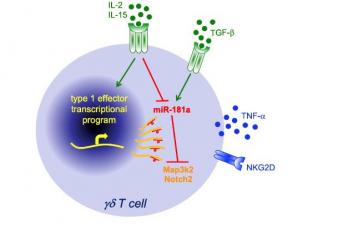Associação Portuguesa de Investigação em Cancro
Impact of miRNA-181a on the regulation of anti-tumor functions of γδ T lymphocytes
Impact of miRNA-181a on the regulation of anti-tumor functions of γδ T lymphocytes

Gisela Gordino1, Sara Costa-Pereira1, Patrícia Corredeira1, Patrícia Alves1, Luís Costa1,2, Anita Q Gomes1,3, Bruno Silva-Santos1 and Julie C Ribot1
1 Instituto de Medicina Molecular João Lobo Antunes, Faculdade de Medicina, Universidade de Lisboa, Lisbon, Portugal
2 Medical Oncology Division, Hospital de Santa Maria, Centro Hospitalar Universitário Lisboa Norte, Lisbon, Portugal
3 Escola Superior de Tecnologia da Saúde de Lisboa, Lisbon, Portugal
γδ T cells are a conserved population of lymphocytes that contributes to anti-tumor responses through its overt type 1 inflammatory and cytotoxic properties. We have previously shown that human γδ T cells acquire this profile upon stimulation with IL-2 or IL-15, in a differentiation process dependent on MAPK/ERK signaling. Here, we identify microRNA-181a as a key modulator of human γδ T cell differentiation. We observe that miR-181a is highly expressed in patients with prostate cancer and that this pattern associates with lower expression of NKG2D, a critical mediator of cancer surveillance. Interestingly, miR-181a expression negatively correlates with an activated type 1 effector profile obtained from in vitro differentiated γδ T cells and miR-181a overexpression restricts their levels of NKG2D and TNF-α. Upon in silico analysis, we identify two miR-181a candidate targets, Map3k2 and Notch2, which we validate via overexpression coupled with luciferase assays. These results reveal a novel role for miR-181a as critical regulator of human γδ T cell differentiation and highlight its potential for manipulation of γδ T cells in next-generation immunotherapies.
EMBO Reports
https://www.embopress.org/doi/full/10.15252/embr.202052234




